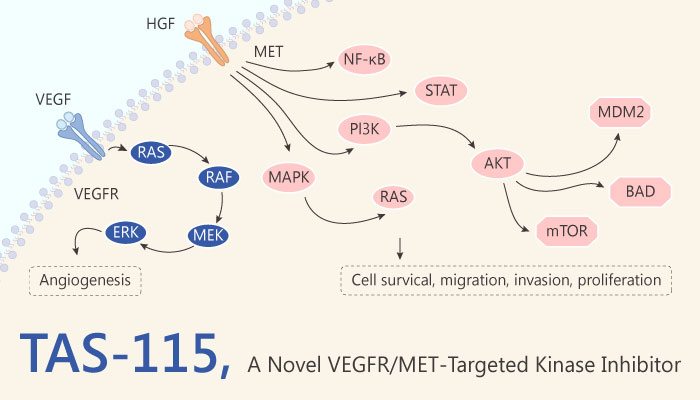VEGF signaling via VEGF receptor is a pivotal factor for tumor angiogenesis that regulates tumor progression. However, VEGFR-targeted inhibitor monotherapies showed limited effects on various carcinomas. And even combination therapies with chemotherapeutic agents are unsatisfactory. MET is a receptor for HGF. The HGF-MET signaling also participated in regulating tumor progression, metastasis, angiogenesis, and resistance to chemotherapy in various cancers. This indicates that MET kinase inhibitors could have major therapeutic potential. Inhibition of both VEGFR and MET signaling pathways has been reported to suppress tumor growth and angiogenesis synergistically. The dual inhibition of VEGFR and MET signals may have potential effects on the prevention of tumor growth.

TAS-115 is a multiple tyrosine kinase inhibitor that preferably targets PDGFR, VEGFR and c-FMS in addition to other molecules. TAS-115 inhibits the phosphorylation of PDGFR on human lung fibroblast cell line MRC-5 cells. It also suppressed their PDGF-induced proliferation and migration. Furthermore, TAS-115 inhibited the phosphorylation of c-FMS, a receptor of macrophage colony-stimulating factor (M-CSF), in murine bone marrow-derived macrophages (BMDMs) and decreased the production of CCL2, another key molecule for inducing pulmonary fibrosis, under the stimulation of M-CSF. In a mouse model of bleomycin-induced pulmonary fibrosis, TAS-115 significantly inhibits the development of pulmonary fibrosis and the collagen deposition in bleomycin-treated lungs. These data suggest that the strong inhibition of PDGFR and c-FMS by TAS-115 may be a promising strategy for overcoming the intractable pathogenesis of pulmonary fibrosis.